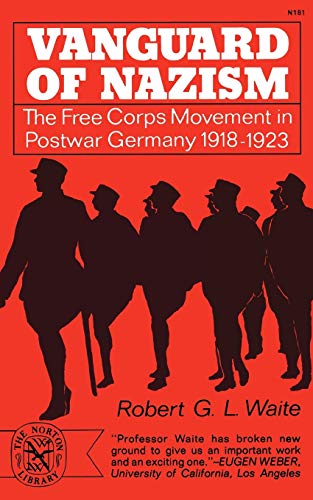Vanguard of Nazism
The Free Corps Movement in Postwar Germany 1918-1923
Robert G. Waite
BOOK REVIEW

In the tumultuous aftermath of World War I, Germany was a nation divided, grappling with chaos, resentment, and a desperate yearning for identity. In this gripping landscape, Robert G. Waite's Vanguard of Nazism: The Free Corps Movement in Postwar Germany 1918-1923 emerges as an essential examination of a dark chapter in history often relegated to the shadows. This riveting work plunges into the very heart of the Free Corps movement, peeling back the layers of radical nationalism that would later plant the seeds for the Nazi regime.
Waite's narrative not only documents the violence and fervor of these paramilitary formations but also exposes the raw emotional undercurrents that fueled their rise. The Free Corps, consisting largely of demobilized soldiers and nationalists, emerged as a reaction against the perceived humiliation of the Treaty of Versailles and the perceived betrayal of the German government. In a deeply meticulous fashion, Waite captures the modicum of hope for revival that these groups offered while simultaneously revealing the terrifying undercurrents that would culminate in the rise of one of history's most abhorrent regimes.
Picture the streets of Berlin in the early 1920s, buzzing with fervent talk of past glories and future ambitions, as young men, filled with a potent mix of remorse and vainglory, marched through the city with a vision of a new Germany. Their ideology was intoxicating, promising to restore national pride amidst the rubble of defeat. Waite brings this vivid historical tapestry to life, painting a picture rich with emotional turmoil, fear, and the insatiable hunger for power. ✊️
Readers are thrust into a whirlwind of societal upheaval, as the Free Corps became an emblem of rebellion against a government seen as weak. The book explores how their violent endeavors-marked by clashes with leftist groups and brutal repressions-served to unsettle the fragile state of postwar Germany. But Waite does more than provide a mere historical account; he stirs in us an awareness of the psychological implications of such movements, urging us to recognize the human heart's capacity for both heroism and horror.
Critics have noted the way Waite constructs his narrative, often described as a "palpable layering of history and psychology." Some argue that while his insights are valuable, there is a concern that he occasionally leans too heavily on emotional appeal rather than a strict academic lens. Yet, isn't it this very emotional intensity that enhances the urgency of his argument? Each page beckons you to reflect deeply on how fervent nationalism can morph into a monstrous entity, reminding us that history is not merely a record of events, but a living, breathing lesson pulsating with relevance.
Those who have traversed the pages of Vanguard of Nazism find themselves grappling with the weight of Waite's revelations. Readers express a spectrum of reactions: while some praise his ability to evoke empathy for those who felt lost in a sea of chaos, others question whether the narrative sometimes romanticizes the turbulent figures it portrays. Yet the brilliance of Waite lies in his unflinching honesty, capturing the duality within this movement-both a call to arms and a descent into madness. It forces us to confront uncomfortable truths about our own society's capacity for division and violence.
As the world watches contemporary echoes of such divisive ideologies, Waite's work serves as a profound reminder. The Free Corps did not appear in a vacuum; they were products of their time, nurtured by the very conditions that humanity continues to grapple with today. The power of Waite's examination lies not just in understanding the past but in illuminating warnings for the present and future. 🌍
Ultimately, Vanguard of Nazism is a crucial lens through which we can observe how fragile democracy can be, and how easily it can be subverted by a wave of populism. It compels you to question: when do passion and patriotism cross the line into fanaticism? This book isn't just about a movement; it's about a harrowing journey into the depths of human emotion-toward danger, passion, and ultimately, a fragment of history that we cannot afford to forget. Open its pages and let its story reverberate within you; the lessons are stark, the warnings loud. Are you ready to listen? 📢
📖 Vanguard of Nazism: The Free Corps Movement in Postwar Germany 1918-1923
✍ by Robert G. Waite
🧾 356 pages
1969
#vanguard #nazism #free #corps #movement #postwar #germany #1918 #1923 #robert #waite #RobertGWaite